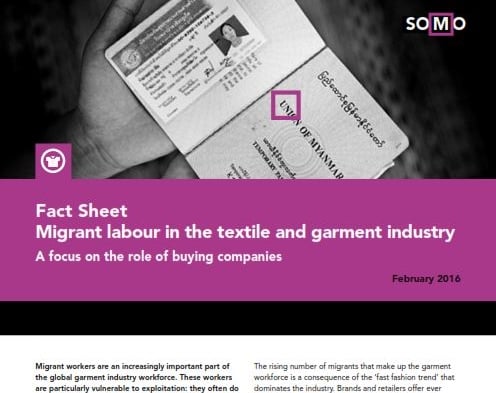
Migrant workers and temporary workers suffer from lack of rights in electronics sector
Electronics manufacturers and telecoms companies are currently investigating what steps they need to take to be compliant with the UN standards for Enterprises and Human Rights. Their CSR reports show that codes of conduct are being adhered to more than before. Indeed, here and there wages are increasing and union rights of permanent workers are being acknowledged. However, there are less permanent workers than before. Migrant workers, temporary workers and students are crowding the workplaces and their employment position is considerably weaker, as various studies of the makeITfair campaign in 2012 clearly show. There are plans to collect more case studies in 2013 of these temporary labourers who have practically no rights.
‘According to labour rights organisation SACOM, 180,000 students are working at Foxconn (supplier to Apple, Dell and others) in China. Foxconn states it is closer to 120,000,’ says Irene Schipper, project coordinator of makeITfair(opens in new window) . ‘This work is presented as if it concerns an internship, while there is no connection at all between the work and the educational institute. If the students stop working, however, they can forget about obtaining a degree.’
This deployment of students is a form of precarious labour – temporary and insecure labour – that makeITfair has been researching for a while. Migrant workers and freedom of union association are also important points of focus within makeITfair.
‘In Mexico, among large brand producers, sometimes 90% of the staff is temporary labour,’ says Schipper. ‘The recruitment agencies often pay lower wages than the company itself does. In the European Union a new law has come into effect in December stating employers have to communicate the salary levels of permanent employees to these agencies. There is no such legislation in Asia yet.’
Asian issues are systematic
Problems concerning flexibilisation of the workforce are not limited to Asia and Latin America. Recent studies in Hungary, the most prominent EU member state for electronics production, has shown that ‘Asian issues’ such as extreme day and night shifts, obstruction of union activity and significant use of temporary labour are systematic. Although Hungarians are EU citizens, they are insufficiently protected by the law.
Companies want to be flexible and to be able to avoid high costs if they have to let workers go.
Schipper: ‘Many brand producers do not sufficiently realise how few rights these temporary workers have and how many of them there are, because they do not study these aspects during their supplier audits.’
Migrant workers in Malaysia
A case study of migrant workers in Malaysia has helped makeITfair put yet another underestimated problem on the agenda. Migrant workers often have to pay hefty fees to be given work by the recruitment agency. Work seekers are subjected to HIV tests and women are even required to take mandatory pregnancy tests.
Schipper: “Last July a meeting was held with the CSR initiatives within the industry, the Electronic Industry Citizenship Coalition (EICC(opens in new window) ) and the Global e-Sustainablity Initiative (GeSI(opens in new window) ) for the IT sector, to discuss the problems concerning temporary workers and the UN Principles for Enterprises and Human Rights, also known as the Ruggie Principles.’
And now and then actual results are booked.
Schipper: “We asked Philips for their position with regards to migrant workers. It was quiet for a while, but then we received an email that they had looked into it and that new policy was certainly required. Philips has now arranged that migrants who work at their factories in Malaysia are allowed to keep their passports and no longer have to pay fees to acquire their jobs. The migrant workers even received a refund of the premiums they had wrongfully paid.’
Importance of new information
makeITfair is planning to record more case studies of migrant workers, temporary workers and about freedom of association. According to Schipper, new information is as important as ever to reinforce our arguments when in dialogue with companies.
In addition to employment conditions, makeITfair also conducts campaigns related to electronic waste and mining. makeITfair is a European public awareness campaign aimed at improving the labour rights situation and work environment in the production chain of consumer electronics, such as mobile telephones and laptops.
Further recent publications by makeITfair:
- Series for Responsible Investor (RI) Engagement: Freedom of association in the global electronics sector
- Series for Responsible Investor (RI) Engagement: Temporary agency work in the electronics sector
- Workers’ rights in the global electronics sector: Report of the makeITfair and GoodElectronics(opens in new window) Round Table of May 2012
- It’s your call: Finding a phone that’s fair
Do you need more information?
-

Irene Schipper
Senior Researcher
Related content
-
Outsourcing Labour Published on:Posted in category:Publication

-
 Migrant workers in Malaysian electronics industry face atrocious working conditionsPosted in category:NewsPublished on:
Migrant workers in Malaysian electronics industry face atrocious working conditionsPosted in category:NewsPublished on: -
 Martje TheuwsPosted in category:Publication
Martje TheuwsPosted in category:Publication Martje Theuws
Martje Theuws
-


